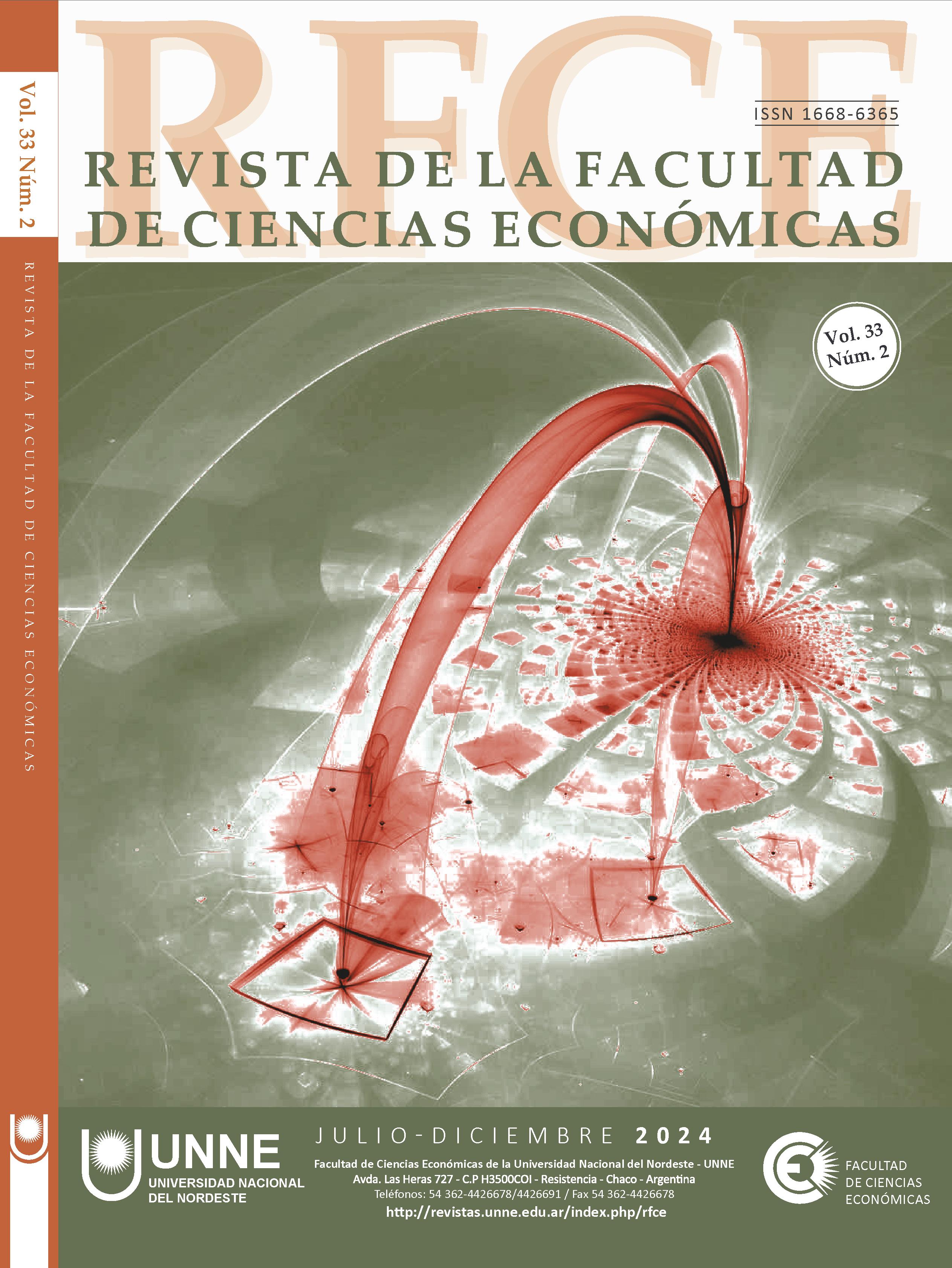Teoría vs. realidad en economía
DOI:
https://doi.org/10.30972/rfce.3327899Palavras-chave:
supuestos, predicción, modelo, similitud, evoluciónResumo
El punto de partida de este artículo es que la economía es una ciencia aplicada. Es una herramienta para comprender la economía del mundo real y una guía para la política económica. La teoría económica debe partir del mundo real –los supuestos deben ser realistas- y el punto de destino también debe ser el mundo real. La elección de los supuestos juega un papel fundamental si se pretende que la teoría económica sirva para interpretar la realidad. La cuestión clave es la similitud entre el modelo teórico y el mundo real. Los fenómenos económicos transcurren en el tiempo. No se puede ignorar la dimensión temporal de los fenómenos económicos. El enfoque evolutivo apunta a analizar la economía como el resultado de un proceso dinámico que conduce, a partir de condiciones iniciales conocidas o plausiblemente conjeturadas en el pasado, hasta la realidad analizada.
Referências
Arrow, K. (2004). Is Bounded Rationality Unboundedly Rational? Some Ruminations. en M. Augier y J.G. March (eds.) Models of a Man: Essays in Memory of Herbert A. Simon, p. 4. MIT Press. Cambridge, MA. DOI: https://doi.org/10.7551/mitpress/4709.003.0007
Boland, L. (2005). Economics “In Time” Vs Time in Economics; Building Models So That Time Matters. History of Economic Ideas. Vol. 13, No. 1, 121-132.
Cairncross, K. (1989). In Praise of Economic History. The Economic History Review, Vol. 42, No. 2, Mayo, 173–185. DOI: https://doi.org/10.1111/j.1468-0289.1989.tb00492.x
Friedman, M. (1953). La metodología de la Economía Positiva. Reproducido en F. Hahn y M. Hollis (comp.). (1986). Filosofía y teoría económica. Fondo de Cultura Económica, México.
Gigerenzer, G. and Goldstein, D. G. (1996). Reasoning the Fast and Frugal Way: Models of Bounded Rationality. Psychological Review, Vol. 103, No. 4, 650–669. DOI: https://doi.org/10.1037//0033-295X.103.4.650
Gräbner, C. (2017). The Complexity of Economies and Pluralism in Economics. Journal of Contextual Economics – Schmollers Jahrbuch, Vol. 137, No. 3, 193–225. DOI: https://doi.org/10.3790/schm.137.3.193
Gräbner, C. y Strunk, B. (2020). Pluralism in economics: its critiques and their lessons. Journal of Economic Methodology. Vol. 27, No. 4, 311–329. https://doi.org/10.1080/1350178X.2020.1824076 DOI: https://doi.org/10.1080/1350178X.2020.1824076
Hindriks, F. A. (2006). Tractability assumptions and the Musgrave-Mäki typology. Journal of Economic Methodology. December, 401/423. DOI: https://doi.org/10.1080/13501780601048733
Kahneman, D. y Tversky, A. (1979). Prospect Theory: An Analysis of Decision Under Risk. Econometrica. Vol. 47, No. 2, March, 263-291. DOI: https://doi.org/10.2307/1914185
Kuhn, T. S. (2012). The Structure of Scientific Revolutions. 4th Edition, University of Chicago Press, Chicago. DOI: https://doi.org/10.7208/chicago/9780226458144.001.0001
Mäki, U. (2005). Models are experiments, experiments are models. Journal of Economic Methodology 12 (2):303-315. DOI: https://doi.org/10.1080/13501780500086255
Nelson, R. R., y Winter, S. G. (1982). An Evolutionary Theory of Economic Change. Belknap Press. Cambridge, MA.
Nelson, R. R., Dosi, G., Helfat, C.E., Pika, A., Winter, S.G., Saviotti, P.P., Lee, K., Malerba, F. y Dopfer, K. (2018). Modern Evolutionary Economics: an Overview. Cambridge University Press. Cambridge. DOI: https://doi.org/10.1017/9781108661928
Ormerod, P. (2014). ‘Notes on a Real World Economics Curriculum’, In M. A. Madi and J. Reardon (Eds.) The Economics Curriculum: Towards a radical reformulation, WEA/College Publications, Bristol.
Reiss, J. (2013), The explanation paradox redux. Journal of Economic Methodology, Vol. 20, No. 3, 280–292, http://dx.doi.org/10.1080/1350178X.2013.828874 DOI: https://doi.org/10.1080/1350178X.2013.828874
Robbins, L. (1932). An Essay on the Nature and Significance of Economic Science. 3a ed.1984. Londres: MacMillan. DOI: https://doi.org/10.1007/978-1-349-17510-9
Sugden, R. (2000). Credible Worlds: The Status of Theoretical Models in Economics, Journal of Economic Methodology, 7, 1–31. DOI: https://doi.org/10.1080/135017800362220
Sugden, R. (2009). Credible Worlds, Capacities and Mechanisms. Erkenn 70:3–27 DOI: https://link.springer.com/article/10.1007/s10670-008-9134-x DOI: https://doi.org/10.1007/s10670-008-9134-x
Sugden, R. (2013). How fictional accounts can explain. Journal of Economic Methodology, 20(3), 237-243. https://doi.org/10.1080/1350178X.2013.828872 DOI: https://doi.org/10.1080/1350178X.2013.828872
Thaler, R. H. (1980). Toward a Positive Theory of Consumer Choice. Journal of Economic Behavior and Organization, Vol. 1, No. 1, 39–60. DOI: https://doi.org/10.1016/0167-2681(80)90051-7
Witt, U. y Chai, A. (2018). Evolutionary Economics Taking Stock of Its Progress and Emerging Challenges. Published online by Cambridge University Press. https://www.cambridge.org/core/books/understanding-economic-change/evolutionary-economics/6844C2CD5DC816ED09110CF24E27BE6B
Yay, T. (2021). Method and Scope in Joseph A. Schumpeter’s Economics: A Pluralist Perspective. Journal of Philosophical Economics: Reflections on Economic and Social Issues, XIV (1-2), 63-107. DOI: https://doi.org/10.46298/jpe.8663
Zamagni, S. y Agliardi, E. (2004). Time in Economic Theory. Edward Elgar. Cheltenham.
Downloads
Publicado
Como Citar
Edição
Seção
Licença

Este trabalho está licenciado sob uma licença Creative Commons Attribution-NonCommercial-ShareAlike 4.0 International License.
La Revista de la Facultad de Ciencias Económicas solicita sin excepción a los autores una declaración de originalidad de sus trabajos, esperando de este modo su adhesión a normas básicas de ética del trabajo intelectual.
La Revista de la Facultad de Ciencias Económicas de la Universidad Nacional del Nordeste, Argentina, declara e informa que no se aplica a los autores ningún cargo ni costo, por la publicación de los artículos. La distribución y acceso, son de carácter libre y gratuito.
Este obra está bajo una licencia una licencia de Creative Commons Reconocimiento-NoComercial-SinObraDerivada 4.0 Internacional.





